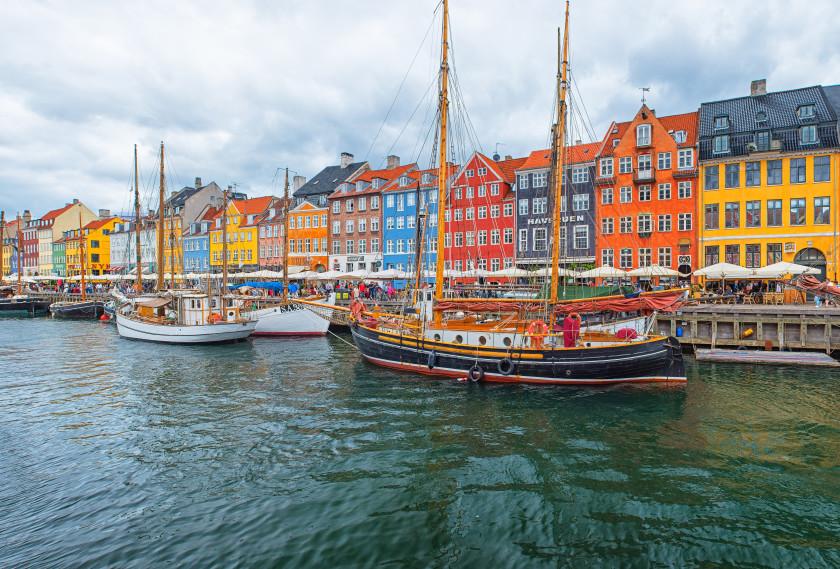Going to university can be expensive, there’s no doubt about it. But if you consider studying abroad, there are lots of places where you can study for free or a fraction of the cost!
1. Germany

Whether you want to explore the hip corners of Berlin or study in a quaint town in the German countryside, you’ll find a place that suits your needs. The country’s higher education system has a strong reputation and, most importantly, tuition is FREE of charge.
All you have to pay is a fee of around €100 (£75) to €250 (£185) per semester, which covers administrational costs as well as the work of the student union.
Life in Germany is relatively cheap compared to other countries, too. The German Academic Exchange Service recommends a monthly budget of around €800 (£595) to cover expenses, which is enough to enjoy your stay without having to pinch pennies.
Check out our options for student accommodation in Germany.
2. Spain

If you want to combine your studies with relaxing in the sun, stuffing yourself with delicious tapas and partying until the sun comes up, why not enrol at a Spanish university? We offer student accommodation in Spain in almost thirty different cities.
For both EU/EEA and overseas students, earning a degree in Spain is relatively cheap. Studies at a public university will cost you between €680 (£505) and €1,280 (£950) a year.
In the Spanish education system, students are charged per credit. For Bachelor’s degrees, a credit is worth between €9 (£7) and €16 (£12). Studying for a Master’s degree or a PhD is more expensive, with credits costing at least €21 (£16) and €27 (£20), respectively.
3. France

France is among the most popular study destinations in the world, with nearly 300,000 students flocking there every year. With its intellectual tradition and bustling student cities, this doesn’t really come as a surprise. On Student.com we list student accommodation in France in over 50 different cities.
What’s even better is that most public universities only charge a registration fee ranging from €200 (£150) to €400 (£300) a year, regardless of a student’s nationality, so they’re great budget options.
But if you’d rather attend one of the grandes écoles (elite schools), which offer renowned programmes in science, engineering and business, then the costs increase. These universities are highly reputed and count many famous alumni among their ranks, so you’ll need to spend between €5,000 (£3,710) and €15,000 (£11,130) a year on tuition.
4. Scotland

Studying in Scotland, you’ll be surrounded by historic castles and incredible scenery. Scottish nationals and students from other EU countries can have their tuition fees paid for by the Student Awards Agency of Scotland, so you could study completely free of charge.
If you’re from England, Wales or Northern Ireland, you’ll have to pay an annual tuition fee that’s set by your chosen university, but there are various bursaries and scholarships to help. Students from outside the EU also have to pay variable amounts.
The biggest student cities in Scotland are Glasgow and Edinburgh, but on Student.com you can book student accommodation also in many smaller cities, such as Aberdeen and Dundee.
5. Brazil

Famous for carnival, dancing and football, Brazil is also a top destination for students wanting to spend as little money as possible on their studies. Public universities, which are more prestigious and offer a higher quality of teaching than their private counterparts, offer free tuition to international students and only charge a small registration fee at the beginning of the course.
In order to secure a place, students need to take a test, competing against thousands of Brazilian students. Knowledge of Portuguese is another requirement, which can be demonstrated by completing the CELPE-Bras – the only certificate for Portuguese that is recognised in Brazil.
If you do manage to be accepted, you are eligible for the same funding options available to Brazilian students.
6. Finland

Finland is one of the cheapest options for people wanting to study in the Nordic countries. Finnish universities charge students no tuition fees for Bachelor’s, Master’s and PhD degrees, regardless of where they come from.
To obtain a residence permit, non-EU/EEA students need to prove they have at least €560 (£415) a month at their disposal, although average living expenses range between €700 (£520) and €900 (£670).
While students are allowed to work up to 25 hours a week during term time, it’s not recommended to rely on a part-time job to make ends meet as they can be hard to find, especially if you don’t speak Finnish or Swedish.
7. Norway

If you want to study for free in Norway, make sure you brush up on your Norwegian first. While international students don’t pay for tuition apart from a small registration fee of around NOK500 (£40), undergraduate degrees are usually taught in Norwegian and language proficiency is a must.
And while studying is very cheap, you shouldn’t ignore the country’s high cost of living. Factor in around NOK10,000 (£800) per month to cover basic expenses. And eating and drinking in restaurants can be quite expensive – a beer will set you back at least NOK75 (£6).
You might consider taking a part-time job, as non-EU/EEA students are allowed to work up to 20 hours a week alongside their studies.
8. Sweden

Sweden is the birthplace of the Nobel Prize and its universities are highly regarded. When you study here, you’ll get a free education like Swedish nationals if you’re from the European Union, the European Economic Area or Switzerland.
That said, if you’re from outside these areas you can expect to pay fees, which range from around SEK80,000 (£6,390) to SEK140,000 (£11,180) annually.
Like other Nordic countries, there is also a high cost of living in Sweden, and you should factor in at least SEK8,000 (£640) per month.
9. Austria

Home to many popular tourist destinations, Austria can be quite pricey. But thanks to free tuition, EU/EEA students can keep their expenses low as long as they finish their degree in the regular time frame.
When you study at a public university, all you need to pay is a contribution to the student union and student insurance of €18 (£13). But if you study longer than eight semesters for your Bachelor’s degree and longer than six for your Master’s, you’ll be charged €360 (£265) per semester.
The tuition fee for overseas students is also relatively reasonable, currently standing at around €725 (£535) per semester. Private universities set their own fees, starting at €1,000 (£740) per semester, and most of the Universities of Applied Sciences (Fachhochschulen) charge students €360 (£265) per semester from the start.
If you are looking for private homes in Austria: www.tempoFLAT.at
10. Greece

Although the news surrounding Greece hasn’t exactly been positive in the past months and the country’s future is still somewhat uncertain, studying in the Hellenic Republic is a great option for students wanting to keep their expenses low.
EU/EEA students study for free with the exception of certain Master’s programmes, while non-EU/EEA students are charged tuition fees of €1,500 (£1,114) annually depending on their institution. Another bonus is that Greece has one of the lowest costs of living in the EU and boasts a rich cultural history and many beautiful islands and beaches.
11. Luxembourg

If you want to live somewhere small and international, check out Luxembourg as a place to study, where nearly half of its 500,000 strong population comes from abroad.
Founded a little more than a decade ago, the country’s only university, the University of Luxembourg, scored second in international outlook and only charges foreign students a small enrolment fee for each semester.
For the first two semesters, students pay €400 (£300). After that, the fee goes down to €200 (£150) per semester.
12. Switzerland

Earlier this year a poll named Switzerland among the world’s happiest countries. And with 12 universities, there are plenty of degree programmed to choose from in this picturesque country.
Tuition fees for international students are relatively low, totalling between CHF500 (£340) and CHF600 (£408) per semester in the French part and between CHF800 (£545) and CHF1200 (£816) per semester in the German part.
But with three Swiss cities ranked in the top five of the world’s most expensive places, the cost of living is undoubtedly high in Switzerland. The good news is that international students are allowed to work during their studies. EU/EEA students can work for as many hours as they wish, while non-EU/EEA students are allowed to work up to 15 hours a week from their third semester onwards. There are plenty of part-time jobs available for students, which usually pay a decent hourly wage of least CHF20 (£13).
If you are looking for private homes in Switzerland: UMS
13. Czech Republic

If you’re fluent in Czech and want to study on a budget, a degree in the Czech Republic is for you. The country was voted the 12th most popular destination among exchange students and is becoming more and more popular among the international community.
One of the contributing factors is most likely the free tuition offered to students from all over the world, who study in Czech at public and state universities. All you have to pay is a registration fee of around CZK500 (£14).
If Czech isn’t your strong suit but you’d still like to study there, you can enrol in an English programme for around CZK27,100 (£740) per semester.
14. Denmark

Denmark is a popular study destination, providing great opportunities for students from the European Union, the European Economic Area and Switzerland. With the same rights as Danish nationals, you’ll benefit from a free education.
As a non-EU/EEA student, however, things are somewhat pricier. Studying in Denmark will set you back between DKK45,000 (£4,500) and DKK120,000 (£11,940) a year.
On top of that, there’s the high cost of living that comes with studying in Nordic countries. On a tight budget, you’ll spend between DKK5,500 (£550) and DKK10,280 (£1,020) a month in Denmark depending on where you live.







I lived on about £1 per day when I studied in Paris back in the 90s! I don’t think that would get you to far these days.
This is great
I like finland thoug i have’nt been there i wish i can study in finland univercity bt nobody that will sponsor me o lord pls help me
Can u Pl send information for admissions into master’s
That is good
Am a nigerian wishing to study in finland hw will i go abt it
I prefer Finland. god I look on 2 u
Great
This is good I love to study abroad
i love Germany
Almighty Allah provide for people who wish to assist me on my education career. I will rather go for Finland.
what about scholarship?
I wish to study in Australia but I gat no one to sponsor me…….So my question is;will there be scholarship for students??
Wow, this is an eye opener. Never new France had schools that are that cheap. The problem that will ensue to study in France is; You have to know how to speak French and my country is not a French speaking country.
This is awesome, I like to study abroad, does it also include free accommodation, free feeding and can someone also work and study?
I which to study in Norway but no supporter But am still looking up to God…
Amazingly great to know this, I wish and hope to study in Czech. Hopefully, for my film and arts programme. God help me.
Wow! this is quite informative.
Thanks a lot Simone for the information. please, can I get information on such universities(Finland & Scotland); their fees and method of applying for admission. thanks.
Good
I love to study business in Spain
Keep me posted on new trends
I like France. Its there any way I can get the admission status on their master degree program?
I think i prefer Finland to study but i need more explanation about the whole thing.
I want too study medicine in Germany so I need how to process it
studying abroad would enhance one’s future,if you can get the right info about getting a suitable institution that fit into your budget.
I really wish I got a slot in Switzerland!
I prefer us for my studies
I prefer USA for my studies
I live in Greece and yes students do study for free but only after giving some exams in Essay writing, Math, Physics etc. Those exams are really hard and certainly do need at least a year preparation and u need to know the Greek language to pass them (I’ve never heard of them being in English).
Do consider it, but keep in mind the small letters in these things.
Free sounds awesome but it comes with a side of trouble.
I will like to study in one of dis country.May God help me
That’s pantastic
I like to study in Finland how can I know more information about the university.
I would like to study my M.sc. in Forensic Science at abroad, because it’s a conducive place to be!!!
I really appreciate the way and manner in which you makes your advert. But to get admission into these universities is very hard. Is there any fastest way to secure admission? Thank you
Makes sense.. Why don’t you update us with universities available in these countries with the kind of programmes they run? Please.
I like to study at sweden if I got the opportunity.
pls I want to proceed on master degrees program in the US, I want to know if there any scholarships for me to actually finance the program in field of environmental science?
I love Germany and I hope to come over there and study my masters.
please i want to go for my msc in Finland and i want to study agricultural economics or Agric education pls what are the requirements i am a Nigerian how do i apply. I
that’s good, I hope so for my self to study at abroad
I like 2 studies in abroad, God help me.
Your education about schooling abroad changed my mentality. Please, how do I get admitted either in an Austria university or any university in Germany?
I love to study in Finland or Norway. God, pls make a way.
I will appricate if I can get a university in Finland to study phd in social work and preferably public university. Thanks
I want to study BNSC nursing abroad, how much will it cost, n how do l go for it
I am a registered nurse in Nigeria, but wants to do my degree in nursing abroad whilst still working n studying,, wic County will be suitable for that, and how do l about it? Like k me up
i need information on master degree programme from germany, finland, normany
studying abroad will be a dream come true
I love to study in Germany so how do I apply for it?
I need to study in abroad but I don have a sponsor
This is impressive, l would like to study @abroad
That’s great. I will have love to study in France but the language is the barrier.
Please I really love to get further information as regards studying in France and also possibly help me out with some contacts.
We can’t answer everyone’s questions individually but we are planning lots more guides about how to get scholarships and study abroad. Sign up for our newsletter, follow us on social media or bookmark us to stay up to date! Thanks: Simon from Student.com
I know I will study abroad someday university of Oxford is my dream school and by the grace of God my dream will come through…
thank you so much, pls do these colleges gives scholarship for masters and what is the criteria or yardstick, especially in countries where English is their official language
please I am already in my year two(200level) in a university in Nigeria..I just want alto ask if its possible for me to get a scholarship in France.
Nice post, I like Finland.
Wao, they are really affordable. I love that of France.
i want to study in south korea !! is there any university that u recommand in ??
Have you checked our post on Asian Universities? Maybe that will give you some pointers!
I love Germany since 8 years old..where my dream is to study at Germany ..one day it will come true ..